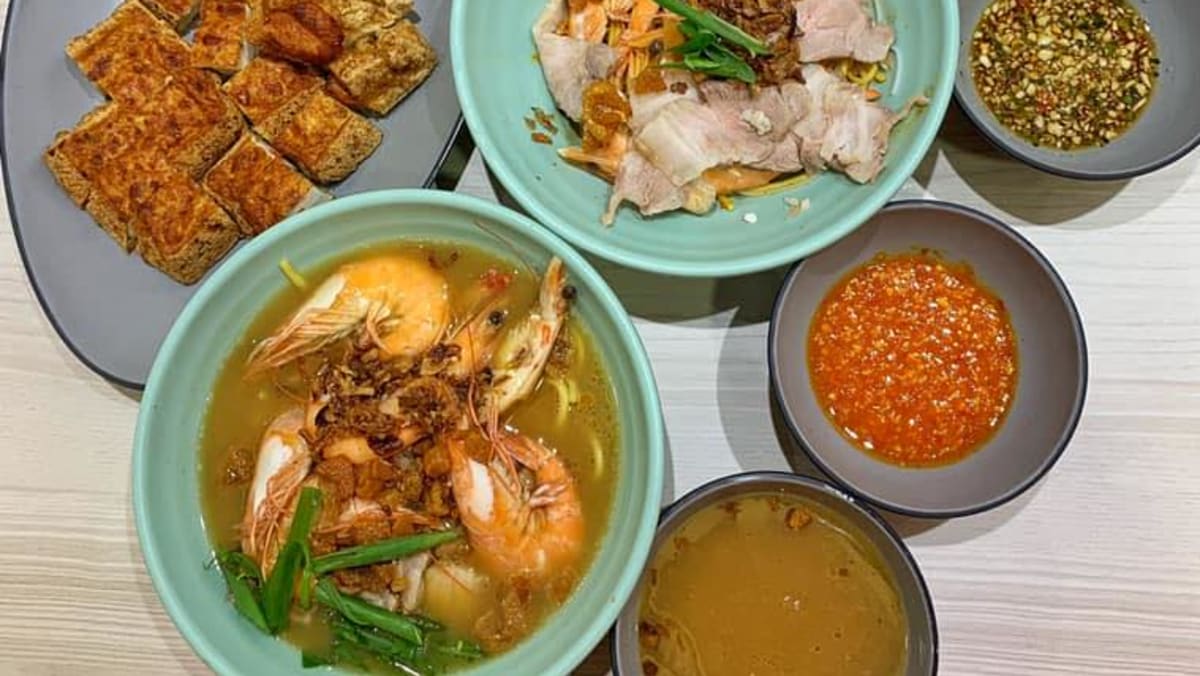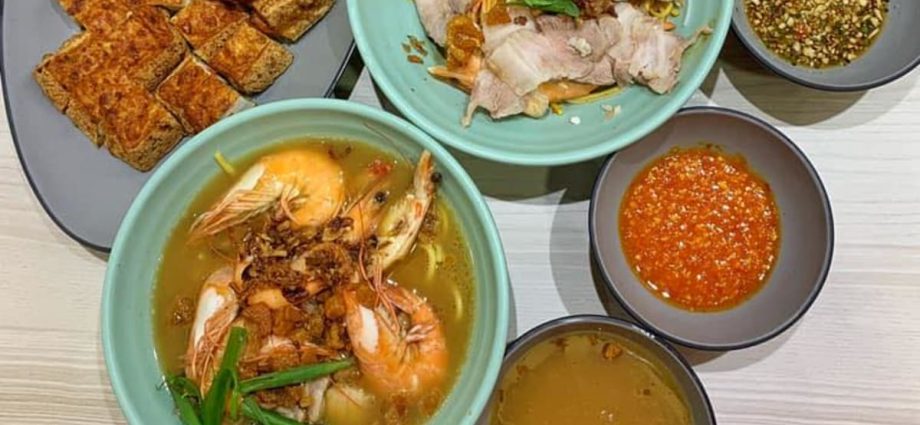
SINGAPORE: They were childhood friends who became business partners in an award-winning prawn noodle shop, but the relationship between the investor and hawker turned sour when the business failed during the COVID-19 pandemic.
It culminated in a court case, with one of them – a former CEO who invested S$350,000 (US$260,000) in the business – suing the other to claw back what he claimed were “loans”.
However, the judge dismissed the claim made by Mr Tan Cheng Soon Don against his hawker friend Mr Teo Aik Hua.
In a judgment made available on Wednesday (Feb 14), District Judge Vince Gui stated that Mr Tan did not produce “a single shred of evidence” to prove his case.
Mr Tan “relied on nothing more than a bare assertion” that the loans were indeed made to Mr Teo, said Judge Gui.
THE CASE
The court heard that Mr Tan and Mr Teo had been childhood friends since their kampung days in Bukit Timah more than 30 years ago.
Mr Tan became CEO and director of Singapore-listed Sin Heng Heavy Machinery.
Mr Teo has been a hawker since the age of 16 and eventually sold his signature prawn noodle dish at Zion Riverside Food Centre, at a stall called Zion Road Big Prawn Noodles, or Fresh Taste Big Prawn Noodle.
The noodles won several accolades, including the Michelin Bib Gourmand in 2018. The Michelin Guide called his dish a “great bowl of noodles” rich in flavour with fresh prawns, chilli and pork rinds.
Judge Gui said this accolade was a “monumental milestone” in Mr Teo’s career, opening doors to all sorts of business opportunities.
An investor reportedly offered S$500,000 for his recipe in 2019. The Select Group, known for its catering business, also offered him a chance to run a stall at “Hawker’s Street” in ION Orchard, with the right to choose a prime spot.
However, Mr Teo was not interested in these opportunities, the judge noted, partly due to his reluctance to work with strangers and fear of being taken advantage of with his little formal education.
Mr Tan, who regularly patronised Mr Teo’s stall, offered to become his business partner to open a restaurant.
Mr Teo did not take up the offer immediately but agreed in June 2020 after hearing that Zion Riverside Food Centre would undergo renovation for a few months.
He estimated that the start-up costs would amount to about S$250,000.
The two men agreed to name the restaurant Zhi Wei Xian @ Zion Road Big Prawn Noodle and set up a company called 2 Bowls in November 2020.
Shareholding in the company was split among Mr Tan, Mr Teo and Mr Teo’s fiancee Lisa Lin at 50 per cent, 30 per cent and 20 per cent respectively.
They agreed that Mr Tan would provide loans to fund the venture, with his loan to be recovered from the company’s profits if it turned profitable. Any excess profits would be split in accordance with the shareholding.
The restaurant opened on South Bridge Road in January 2021.
Mr Teo and Ms Lin managed day-to-day operations. He introduced new dishes such as a cold crab to elevate the restaurant’s standing. He also personally selected wild-caught prawns at Jurong Fishery Port every day after midnight.
Mr Tan disbursed S$250,000 in total into the company’s bank account over about six months.
THE BUSINESS’ DEMISE
When the government tightened COVID-19 measures in 2021, such as restricting dining group sizes, business was affected.
The restaurant closed its doors at one point to cut costs.
As funds were low, Mr Teo and Ms Lin sought more loans from Mr Tan.
Mr Tan later rejected a draft agreement presented to him on Sep 21 that year. According to Mr Teo and Ms Lin, Mr Tan threw the agreement on the table and said angrily that he would not sign it.
Mr Teo then said the restaurant would have to close.
They did so a week later, with Ms Lin sending Mr Tan a letter confirming the closure and other matters.
Mr Tan replied saying he agreed on the condition that Mr Teo transferred S$50,000 into the company’s bank account and the company paid Mr Tan S$50,000.
Ms Lin replied saying that Mr Teo did not agree to bank in S$50,000. She wrote that the understanding had always been that Mr Tan contributed funds to the company while Mr Teo and Ms Lin contributed “goodwill and branding”.
She added that it was Mr Tan who approached Mr Teo to start the business. If Mr Teo was required to put in money, he would not have worked with Mr Tan, said Ms Lin.
He could have worked with “big boys” such as Select Group, who purportedly offered to bear all the financial costs. She added that the company could not pay Mr Tan before the other creditors.
In response, Mr Tan affirmed their respective job scopes and responsibilities – that he was responsible for S$250,000 in “paid up capital contribution”, that Mr Teo was responsible for “food/cooking/strategy and branding” and Ms Lin was responsible for accounting, payments and HR matters.
Mr Tan said it was Mr Teo who asked him for advice, saying someone offered S$300,000 for the prawn noodle recipe.
Mr Tan then said that Mr Teo could consider rebranding the hawker stall and selling it at a better price. Mr Tan said Mr Teo had called him up only after failing to come to terms on a proposed venture with someone else.
Mr Tan argued that a total of S$162,500 from his “loans” of S$350,000 should be repayable to him.
He claimed that Mr Teo was evasive on the stand and had given false evidence, while Ms Lin was not a credible witness.
Mr Teo argued that the loans had been extended to the company alone. He supported this with witnesses and contemporaneous records.
JUDGE’S FINDINGS
Judge Gui found that Mr Tan had not proven his claim.
“His entire closing submissions rests on what he considered would have been a favourable deal for his entering into the venture,” said the judge.
“But the court does not rewrite the agreement to favour one party or another. The court looks at what was the objective understanding at the time the agreement was entered into.”
Judge Gui said Mr Tan, as a director and former CEO of a listed company, ought to have known the significance of not documenting a loan allegedly made to another individual.
Mr Tan’s claims that loans were made to Mr Teo were not backed by any documentary proof, the judge said.
Giving his view on the case, Judge Gui said Mr Tan had invested in the company by way of debt financing. If the restaurant succeeded, Mr Tan’s loans would be repaid by the profits, and he would stand to reap further profits as a 50 per cent shareholder.
“He stepped into the venture with buoyant spirits, confident that the restaurant, backed by a chef with the Michelin Bib Gourmand accolade, would attract the same following as the defendant’s hawker stall did,” said the judge.
“His predictions however did not come to fruition. The restaurant failed to escape the scourge of the COVID-19 pandemic which continued to linger and surge in the ensuing months.”
Judge Gui noted that Mr Tan’s investment of S$350,000 was substantially more than the S$250,000 he expected to commit at the outset.
He said Mr Tan changed tack to recover his losses, first claiming that Mr Teo and Ms Lin were required to contribute financially to the company because of their equity stake, then saying that the money was a loan.
“His claim however was not only unsubstantiated but also contradicted by the evidence,” concluded the judge.

